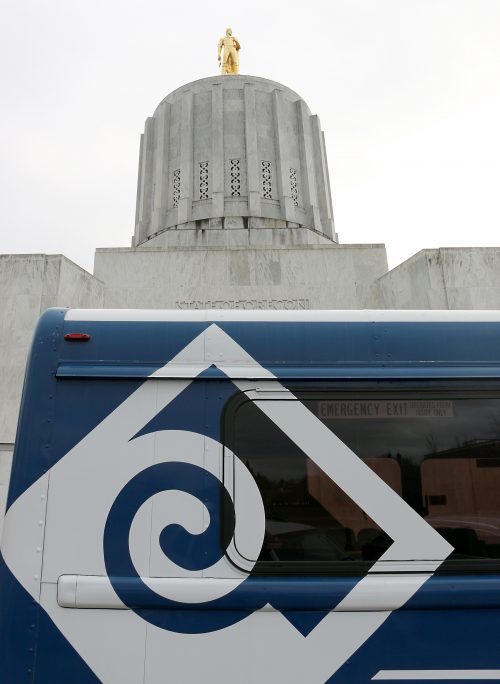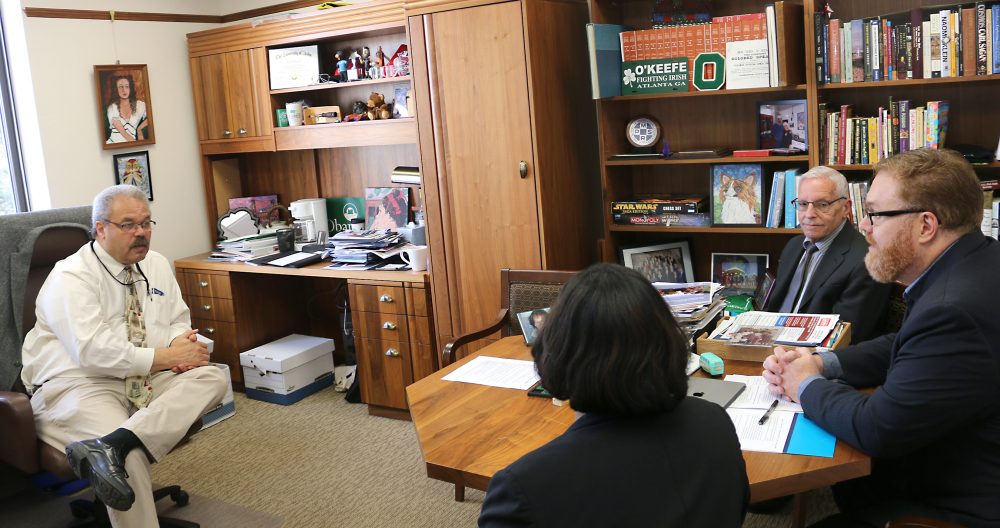This content was published: January 7, 2019. Phone numbers, email addresses, and other information may have changed.
Community colleges take their 2019-21 budget case to legislators
Photos and story by James Hill
Day at the Capitol
Join PCC in Salem for it’s annual day with Oregon legislators where students, staff and community champions tell them their stories and thank them for investing in higher education.
The day will feature:
- Free transportation to and from Salem.
- Lunch and legislative program.
- Meet with your area’s senators and representatives.
- Attend House and Senate floor sessions.
It’s January 2019. College students are returning to classes and getting to work on their studies as winter term begins. At the same time, Oregon’s community colleges are rolling up their sleeves and getting to work in Salem.
The Oregon Legislature launches its session Jan. 22, when the delicate balance of creating laws and determining funding for state agencies begins. As part of this process, legislators will decide how much of the budget should be earmarked for the state’s 17 community colleges, also called the Community College Support Fund (CCSF).
Advocacy for community colleges this legislative session will be critical. In November, Gov. Kate Brown released her Governor’s Recommended Budget (GRB), and it proposed a “base budget” of $543 million for the CCSF, which is 4.8 percent below the 2017-19 support budget. If this funding level remains as is for the next biennium, deep cuts and huge tuition hikes at community colleges will be the net result.
At PCC, it will translate to double-digit tuition increases. If the base budget becomes reality it will mean 17.5-percent tuition hikes in each of the next two years, or 35 percent for the biennium. This will be devastating for PCC students given their circumstances: 45 percent of them are the first in their families to go to college; 30 percent have children; 36 percent receive Pell grants because they are low income; 13 percent experience homelessness; and two-thirds face food insecurity.
These are students who can least afford such cost increases.
“Those most affected by the proposed budget would be our students, whose access to higher education would be limited because of the funding shortfall,” said PCC President Mark Mitsui. “Such limitations run counter to our mission and commitment to opportunity and equitable student success.”
But hope is on the horizon. President Mitsui and presidents from the other 16 community colleges in Oregon will meet with representatives throughout the session to drive home just how critical it is for the state’s success to fund community colleges. They’ve asked for a base budget of $647 million, plus $140 million to fund career technical education (CTE) and student support programs.
In Oregon, 50 percent of all jobs are middle skills, meaning they require education beyond high school but not necessarily a four-year degree. Yet only 45 percent of all workers have the skills to fill such positions. Funding for CTE would add capacity, doubling the number of graduates by 7,900 annually to help close the industry skills gap. This would include opening new seats in healthcare programs, graduating more STEM students, and responding to needs expressed by industry leaders in the fields of microelectronics, manufacturing, computer technology and business management.
At PCC, CTE programs are popular because of their graduates’ high employability: 100 percent of radiography students find employment immediately after graduation; 90 percent of microelectronics and health information management grads land jobs right away; and 87 percent of medical assisting students transition into positions within their field shortly after finishing up their time at PCC.
“Community colleges are a fundamental part of our educational pipeline, with proven programs to problem solve many of our region’s needs — if properly and realistically funded by the state legislature,” Mitsui added.
This term and into the spring, PCC staff, employer partners and community ambassadors will head south to Salem to tell their representatives and senators the importance of funding for colleges like PCC. Their visits will culminate in the college’s annual “Day at the Capitol” event on March 12 and includes a full day of advocacy on behalf of PCC and Oregon community colleges.
Telling the stories of community college students is important because, as President Mitsui has said, the funding decisions in Salem this session will most impact them. Successful and inspiring stories like…
- America Rodriguez, a DREAMer who couldn’t have started her college career in engineering without PCC’s support programs guiding her through her journey.
- Lilly Boone, a CTE student in automotive, who will provide services to people in need after graduation.
- Ryan Walker, who excelled in the college’s diesel service partnership with Caterpillar because of the demand for qualified workers in the industry.
- Mare Cox, who saw benefits in PCC’s low tuition to earn her associate degree, then transfer to OHSU’s School of Nursing.
As Boone shared in her story, “Stuff happens in students’ personal lives, and they need someplace to go to get help so they can focus on succeeding. This is why I am passionate about helping my fellow students realize the resources that are available at PCC because it provides so much for them to excel.”

